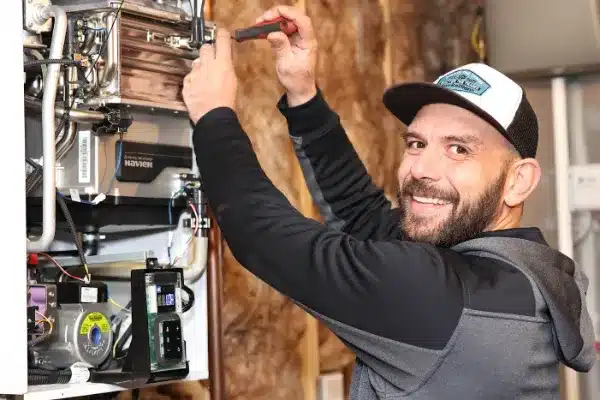461 Trusted Reviews
461 Trusted Reviews

When plumbing issues arise, rely on the expertise of Platinum Plumbing, your trusted local service provider in Bloomington Normal, Illinois. Our team of technicians is equipped with the expertise, experience, and state-of-the-art tools necessary to promptly address a wide range of plumbing concerns. Whether it’s dealing with burst pipes, repairing water heaters, addressing sewer line issues, fixing fixtures, or resolving common bathroom and kitchen plumbing problems, we’ve got you covered.
Your water heater may still be providing hot water, but there are common issues that Platinum Plumbing knows to look for that can be solved with quick repairs. If you notice any of the following, a problem may be present & it’s time to call the professionals for a broken water heater repair:
Is your gas or electric water heater producing water that is too hot or too cold, or no hot water at all? Your home’s hot water heater may be facing a thermostat issue, or a buildup of sediment.
Leaking water could be a sign that your T&P valve has failed, or that an inlet or outlet pipe is loose. Give Platinum Plumbing a call before it’s too late and the issue becomes more expensive to fix.
If your hot water heater is producing rusty or brown-colored water this may be a serious sign that the interior of your water heater has corrosion, and a leak is nearly inevitable. Call a Platinum Plumbing water heater repair expert right away to have your home’s gas or electric water heater professionally diagnosed & repaired.
Stinky or smelly water coming from your hot water tank is likely due to a high level of bacteria. Smelly water is seen in homes with well water as their primary water source. If unsure, check your water bill to see where your water is sourced. The most common solution is replacement of the anode rod, but it’s not limited to just that. Several issues may be present, so it’s best to call the water heater repair experts at Platinum Plumbing.

No matter the problem, our Bloomington, IL water heater repair plumbers will determine what needs to be fixed before any work is done, so you will know exactly what solution is best for your water heater.
We offer a full line of installation, maintenance & repair that your home water heater may require, no matter the problem or time of year. You can count on the trusted professionals at Platinum Plumbing for exceptional service & quality craftsmanship.
Common water heater services that our plumbers provide are:

461 Trusted Reviews
Powered by

In most cases, it is worth it to repair a hot water heater! Signs you need to replace your water heater include old age or if frequent repairs have been needed. Otherwise, as long as the repair isn’t too expensive, it is generally worth it to repair a hot water heater.
The most common problems with water heaters are leaks, discolored water, and corrosion. If you encounter problems with your home’s water heater, call Platinum Plumbing today to schedule a repair.
Yes, water heaters can be repaired. Platinum Plumbing has the premier hot water heater repair experts in the Bloomington, IL area.
Most conventional storage-style water heaters have an average lifespan of 8 to 12 years, depending on the quality and maintenance of the unit. Tankless models may last up to 20 years or more with proper care and maintenance.
The most common type of water heater repairs involve replacing faulty parts, such as thermostats, heating elements, and valves. In some cases, you may need to recalibrate the thermostat or replace a tank if it is corroded or leaking. Other issues may include sediment buildup in the tank or clogged pipes due to hard water deposits.
In some cases, it might be more cost-effective to have your existing unit repaired rather than replaced. However, if your water heater is more than 8 years old and showing signs of wear and tear, you may want to consider replacing it with a newer, energy-efficient model. Platinum Plumbing can help you evaluate your options and determine the best solution for your Bloomington, IL water heater repair needs.

© 2024 All rights reserved. Platinum Plumbing | Privacy Policy | Powered by CAMP Digital